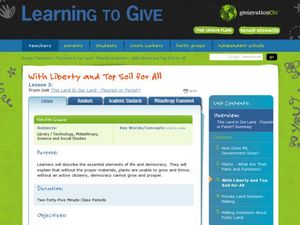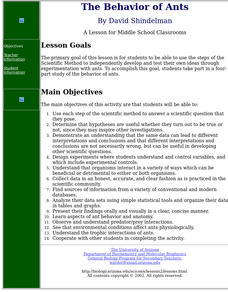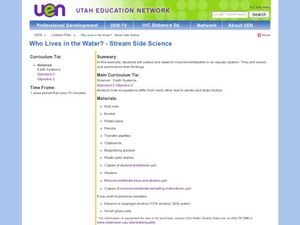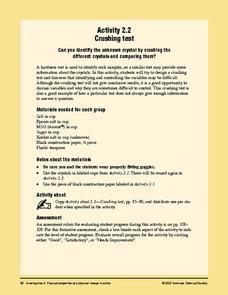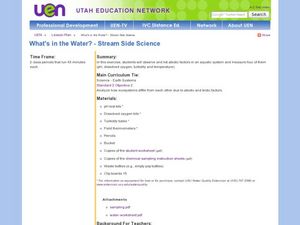Curated OER
Germinating Seeds on Gelatin
Students germinate seeds in unflavored gelatin to which liquid house plant food has been added. Students observe and record plant growth in this medium with a variety of variables in a number of experiments.
Curated OER
Night Creatures of the Kalahari
Students conduct an experiment to demonstrate how fruit fly populations are controlled by spiders. They observe a variety of environments with fruit flies and spiders and consider how vital spiders are to controlling the insect population.
Curated OER
Fertilizer Frenzy
Learners design and conduct an experiment testing the effect of fertilizers/soaps on algal growth. They estimate and predict, identify the variables, formulate a hypothesis, and record and analyze the data, presenting their findings in a...
Curated OER
Solar
Students study solar energy. In this renewable energy lesson students complete several lab activities using different controls and variables.
Discovery Education
The Everyday Science of Sports
Physical science juniors will enjoy this sensational enrichment on aerodynamics, especially if they are also sports fans! With a focus on physical features and behaviors, collaborative groups make observations on five different golf...
American Chemical Society
Mysterious M&M's
The first in a six-lesson mini unit, all using M&Ms® candies, this physical science activity gets kids to observe a single piece and discover what happens when it is placed in a plate of water. The activity can be used to introduce...
American Chemical Society
Can Liquids Dissolve in Water?
How does food coloring work? Classes watch a demonstration showing liquids dissolving in liquids. In groups, they then explore the ability of other liquids to dissolve in water (alcohol, mineral oil, and corn syrup) by setting up and...
American Chemical Society
Using Chemical Change to Identify an Unknown
If you discover an unknown powder, how do you determine if it is safe? Lesson uses four different tests to identify the properties of various powders that appear the same. Then scholars get an unknown powder and have to determine which...
Curated OER
Curve Ball
Create a Height-Time plot of a bouncing ball using a graphing calculator. Graph height as a function of time and identify the vertex form of a quadratic equation that is generated to describe the ball's motion. Finally, answer questions...
American Chemical Society
Using Dissolving to Identify an Unknown
There is a solvent called aqua regis that can dissolve gold! After observing a solubility demonstration, groups receive four known crystals and one unknown. Based on the demo, they design an experiment to determine the identity of the...
American Chemical Society
Does Temperature Affect Dissolving?
When making sweet tea, why do people dissolve the sugar in hot tea instead of cold tea? The class discusses the previous lab and builds upon it. Working in groups, they design an experiment to determine how temperature affects the...
Curated OER
The Amazing Apple
Students analyze an apple. In this lesson about developing inquiry skills, students do an experiment with an apple. Students make several observations about the apple. Students answer questions to help them improve and practice their...
Curated OER
With Liberty & Top Soil for All
Students compare the basic needs of plants to the basic needs of democracy. In this democracy comparison lesson, students complete a worksheet on what happens to a plant that's not nourished. Students draw a correlation to the basics of...
Curated OER
The Behavior of Ants
Young scholars use the steps of the Scientific Method to develop and test their own ideas through experimentation with ants.
Curated OER
What Plants Need in Order to Survive and Grow: Soil
Students conduct an experiment to evaluate whether plants need soil to survive and grow. They plant two seeds, one with soil and one without, make predictions, and record and analyze the seed germination results on a worksheet.
Curated OER
The Colors of Chemistry
Students investigate the acidity and alkalinity of common household products in an experiment. They use red cabbage juice and litmus paper to show the difference between strong acids and bases as they work with vinegar, dish washing...
Curated OER
Who Lives in the Water? Stream Side Science
Andree Walker thought of everything when he wrote this resource. It includes a detailed list of materials and background information links for the teacher. In addition, it has procedures, a macroinvertebrate identification key, and tally...
Curated OER
Designing Experiments - Overview
Students explore the concepts that enable them to design and conduct sound scientific experiments. They critique a faulty experiment and become familiar with some of the criteria of a good experiment. They conduct their own experiment.
American Chemical Society
Evaporation
This is one in several lessons that explore the relationship between temperature and phase changes of water. After some discussion, elementary physical scientists place wet paper toweling on a hot and a room-temperature water bag and...
American Chemical Society
Why Does Water Dissolve Sugar?
Did you know that if you wait long enough, the M on the outside of an M and M will float to the surface when submerged in water? Learners observe the sugar coating of an M and M while it is dissolving in water. They explain how this...
American Chemical Society
Crushing Test
Solidify understanding of the properties of crystals by crushing them to compare hardness. After some class discussion, a procedure is planned, and then small groups go about making observations as they crush five different crystal...
Curated OER
What's in the Water? - Stream Side Science
Here is a complete activity in which young biologists or ecologists test the pH, dissolved oxygen, turbidity and temperature of stream water. The class visits an actual stream and makes observations of the site. They use scientific...
NASA
Foam Rocket
When going for distance, does it make a difference at what angle you launch the rocket? Teams of three launch foam rockets, varying the launch angle and determining how far they flew. After conducting the series of flights three times,...
Beyond Benign
In a Lather
Time to come clean! Scholars continue preparing the shampoo they created in the previous two lessons. The purpose of this stage is to calculate the perfect amount of additive to make the shampoo lather.
Other popular searches
- Identifying Control Variable
- Control Variable Science
- Graphing Control Variable
- Control Variable Experiment
- Science Control Variables
- Process Control Variable
- And Control Variables
- Control Variable Lesson
- Control Variable Sconce
- Control Variable Scjence
- Soil Control Variable
- Variables Control














